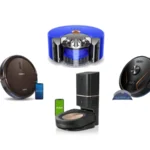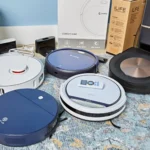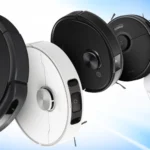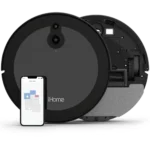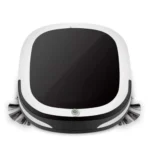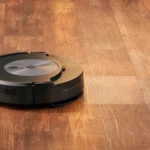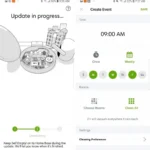Picture this – You’re tired after a long day at work, and the last thing you want to do is spend hours cleaning your home. This is where the magic of smart vacuum cleaners comes into play. These technologically advanced machines are equipped to clean your house with minimal effort from you. However, there’s one crucial factor that can affect the performance of these machines – the battery life. In this article, we’ll dive deep into the impact of battery life on the performance of smart vacuum cleaners. We’ll cover everything from how they work to how you can extend their battery life. If you’re considering buying a smart vacuum cleaner, this article is a must-read.
What is a Smart Vacuum Cleaner?
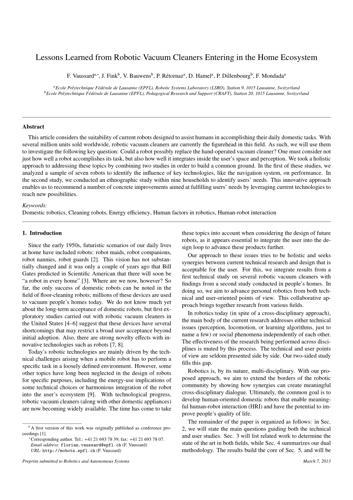
A smart vacuum cleaner is a recent technological advancement that can help reduce tedious tasks such as sweeping and vacuuming. It is an automated cleaning device that is designed to clean floors, carpets, and upholstery, among other things, without human intervention. It employs different technologies such as sensors, cameras, and mapping software to navigate the room and clean efficiently.
How Do They Work?
Smart vacuum cleaners are designed to work in a way that saves time and energy. The machines are programmed to detect obstacles, navigate around furniture, and find the best path to clean the entire room. They use different types of sensors such as laser sensors, infrared sensors, and cliff sensors to navigate the environment. These sensors detect the distance between the vacuum cleaner and objects in the room, allowing it to avoid obstacles and move around them.
The vacuum cleaner has a motor that creates suction, and it is this suction power that picks up dirt, dust, and other particles. The dirt is then collected in a bin that can be emptied later. Some smart vacuum cleaners have a motorized brush that dislodges dirt from carpets and other surfaces, ensuring that every inch of the room is clean.
What Are the Benefits of Using a Smart Vacuum Cleaner?
There are several benefits of using a smart vacuum cleaner, one of which is convenience. These devices are designed to work unattended, so you can program them to clean your home while you are away. They save you the time and energy it would take to clean your home manually.
Smart vacuum cleaners are also efficient cleaners. They use sensors and mapping technology to clean the entire room effectively. They can navigate through tight spaces and around obstacles, ensuring that every inch of the room is cleaned. Additionally, some smart vacuum cleaners can be controlled through a mobile app, allowing you to activate or shut them off from anywhere.
The convenience, efficiency, and technological advancements of smart vacuum cleaners make them a valuable asset in any home.
If you want to learn more about the importance of checking your smart vacuum cleaner’s battery life, please click on this link.
How Do They Work?
Smart vacuum cleaners are revolutionizing the way we clean our homes. These innovative devices use advanced sensors and software to navigate around furniture and obstacles, ensuring that every corner of your home is thoroughly cleaned. But have you ever wondered how these smart vacuums work? In this section, we will take a closer look at the technology behind smart vacuum cleaners and how they navigate your home with ease. For more information on how to check and maintain your smart vacuum’s battery, check out our guide on Smart Vacuum Battery Check.
What Are the Benefits of Using a Smart Vacuum Cleaner?
Using a smart vacuum cleaner can be a game changer when it comes to keeping your home clean and tidy. Here are some of the benefits of using a smart vacuum cleaner:
- Saves time and effort: With a smart vacuum cleaner, you can schedule cleaning sessions and sit back while it does the work for you. This is particularly useful for busy individuals who don’t have much spare time to dedicate to cleaning their homes.
- Better cleaning performance: Smart vacuums are designed to be efficient and effective at cleaning floors and carpets. They often feature advanced sensors and mapping technology to ensure thorough cleaning coverage with less effort on your part.
- Improved indoor air quality: Many smart vacuums come equipped with advanced air filtration systems that can capture dust, pet hair, and other allergens that can negatively impact indoor air quality. This can be particularly beneficial for those who suffer from allergies or respiratory conditions.
- Convenience: With features like voice control and smartphone apps, smart vacuums are incredibly convenient to use. You can start, stop, or schedule cleaning sessions with just a few taps on your phone or the sound of your voice.
- Cost-effective: While smart vacuums can be more expensive than traditional models, they can often provide better value over time. This is because they are more energy efficient and typically last longer due to their advanced components and regular software updates.
A smart vacuum cleaner can make the chore of cleaning your home much more manageable, freeing up your time and energy for other tasks. However, it’s important to consider factors like battery life and type, charging time, and runtime when choosing a model that will meet your needs. In the next section, we’ll take a closer look at how battery life impacts smart vacuum cleaner performance.
If you’re experiencing issues with your smart vacuum cleaner battery, such as degraded performance or shortened runtime, be sure to check out our guide on smart vacuum cleaner battery troubleshooting. Additionally, if you’re wondering which type of battery is best for your smart vacuum, you can find more information in our article comparing Lithium-ion vs. NiMH batteries for smart vacuums.
How Does Battery Life Affect Performance?
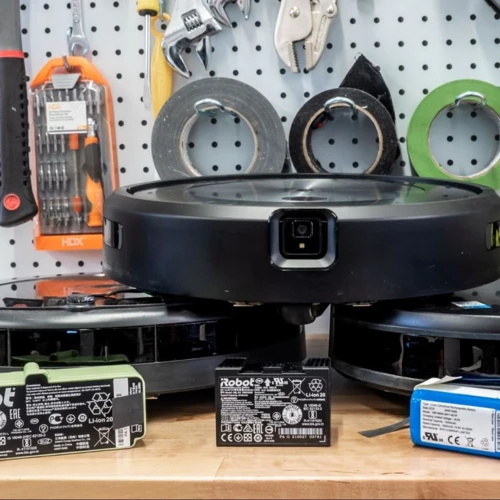
One of the most significant factors that affect the performance of a smart vacuum cleaner is its battery life. When the battery life begins to degrade, it can affect the suction power and the runtime of the vacuum cleaner.
Suction Power
The suction power of a smart vacuum cleaner is directly proportional to the battery voltage. As the voltage drops, the suction power decreases, which affects the cleaning performance of the vacuum cleaner. If the suction power is weak, the vacuum cleaner may not be able to pick up dirt, dust, or pet hair, leaving your floors dirty and untidy.
Battery Runtime
The battery runtime is another vital aspect that affects the performance of a smart vacuum cleaner. When the battery is fully charged, the runtime of the vacuum cleaner will be at its best. However, as the battery life degrades, the runtime of the vacuum cleaner gradually decreases. The vacuum cleaner may require multiple charging cycles to complete a cleaning session or may not even have enough power to finish cleaning your entire home.
Smart Features
The battery life can also affect the performance of a smart vacuum cleaner’s smart features. Some smart features, such as mapping and app connectivity, require more power to operate. When the battery life is low, the vacuum cleaner may not be able to perform these smart features, which can be frustrating if you’re relying on them to control your smart vacuum.
To avoid the negative impact on the performance of a smart vacuum cleaner due to low battery life, it is crucial to consider the battery’s capacity when purchasing one. You should opt for a smart vacuum cleaner that has a long battery life, so you don’t have to worry about charging it too often.
It is also essential to consider the type of battery used in the vacuum cleaner, as not all batteries are created equal. Lithium-ion batteries are the most common type of battery used in smart vacuum cleaners as they offer a longer runtime and faster charging time. Additionally, you should also consider the charging time of the vacuum cleaner and how long it takes to charge fully.
To prolong the battery life of your smart vacuum cleaner, you should practice proper maintenance and care. Regularly cleaning the filter and brush and storing the vacuum cleaner in a cool, dry place are some necessary precautions to take. It is also recommended to read manufacturer instructions on how to use and care for the battery to prevent degradation.
Understanding the impact of battery life on the performance of your smart vacuum cleaner is necessary. Knowing what to consider when purchasing one and how to extend its battery life will help you maintain excellent cleaning performance and save money on replacement batteries.
Suction Power
One of the most important factors that determines the efficiency of a smart vacuum cleaner is its ability to maintain consistent suction power throughout the cleaning process. The suction power of a smart vacuum cleaner is directly related to its battery life, as it relies on the battery to power the motor that generates the suction. If the battery life is inadequate, the suction power will decrease, and the device will not be able to pick up dirt and debris efficiently. In the next sections, we will delve deeper into the different aspects of battery life that impact a smart vacuum cleaner’s performance, including battery runtime and smart features. Additionally, we will provide tips on how to extend your smart vacuum cleaner’s battery life and recommend some of the best models with long battery life.
Battery Runtime
One of the most crucial aspects that affects the performance of a smart vacuum cleaner is its battery runtime. The battery runtime refers to the duration for which the vacuum cleaner can run before it needs a recharge. It is an essential factor to consider as it determines the effectiveness of the device in cleaning your home.
To give you a better idea of what to expect, we have created an html table with some popular smart vacuum cleaner models, their respective battery runtimes, and the floor area they can cover per charge.
| Smart Vacuum Cleaner Model | Battery Runtime | Coverage Area |
|---|---|---|
| iRobot Roomba i7+ | Up to 75 minutes | Up to 1850 sq. ft. |
| Eufy RoboVac 11S Max | Up to 100 minutes | Up to 1200 sq. ft. |
| Shark IQ R101AE | Up to 90 minutes | Up to 1000 sq. ft. |
It is important to note that the battery runtime may vary based on factors like the power setting, floor type, and age of the battery. If you have a large home, you should opt for a vacuum cleaner with a longer battery runtime so that it can cover more area without requiring frequent recharging.
If you notice that your smart vacuum cleaner’s battery runtime has decreased significantly, it may be a sign that you need a battery replacement. Additionally, excessive charging cycles and improper storage can lead to degradation of the battery, resulting in shorter battery runtime. It is crucial to take proper care of your smart vacuum cleaner battery and follow prevention tips to ensure that it lasts longer.
Smart Features
The battery life of a smart vacuum cleaner has a significant impact on many of its features, including its smart capabilities. Smart features allow the user to control the vacuum cleaner remotely, create schedules, and even monitor battery life. However, if a vacuum cleaner’s battery life is too short, it can negatively impact the effectiveness of its smart features.
Remote Control: Many smart vacuum cleaners have the ability to be controlled remotely using a smartphone app. This feature allows the user to start and stop the vacuum cleaner, adjust settings, and even control the vacuum cleaner’s movements. With a shorter battery life, the user may not be able to fully take advantage of this feature as they will need to conserve power.
Scheduling: One of the most popular smart features of vacuum cleaners is the ability to set a cleaning schedule. With longer battery life, the user can schedule cleanings more frequently, ensuring the house remains clean. However, if the battery life is too short, the vacuum cleaner may not be able to complete a full cleaning cycle which can cause inconvenience and wasted time.
Battery Monitoring: Smart vacuum cleaners can inform the user of the battery life remaining, giving them the ability to know when it’s time to recharge the device. A short battery life can make this feature less useful as the user will need to check the battery status more frequently, which can be inconvenient.
To fully enjoy the smart features of a vacuum cleaner, it’s important to consider the battery life when purchasing one. The table below displays a comparison of different smart vacuum cleaners with their battery life and key features.
| Vacuum Cleaner Model | Battery Life (minutes) | Smart Features |
|---|---|---|
| iRobot Roomba i7+ | 120 | Advanced mapping technology, voice control, smartphone app control, scheduling, automatic recharge and resume. |
| Eufy RoboVac 11S Max | 100 | BoostIQ technology, smartphone app control, scheduling, automatic recharge. |
| Shark IQ R101AE | 90 | Voice control, smartphone app control, scheduling, automatic recharge. |
Before purchasing a smart vacuum cleaner, consider the battery type and capacity, charging time, and expected runtime. A higher battery capacity and shorter charging time may be worth the investment as they can extend the runtime of the vacuum cleaner and the effectiveness of its smart features.
What Should You Consider When Buying a Smart Vacuum Cleaner?
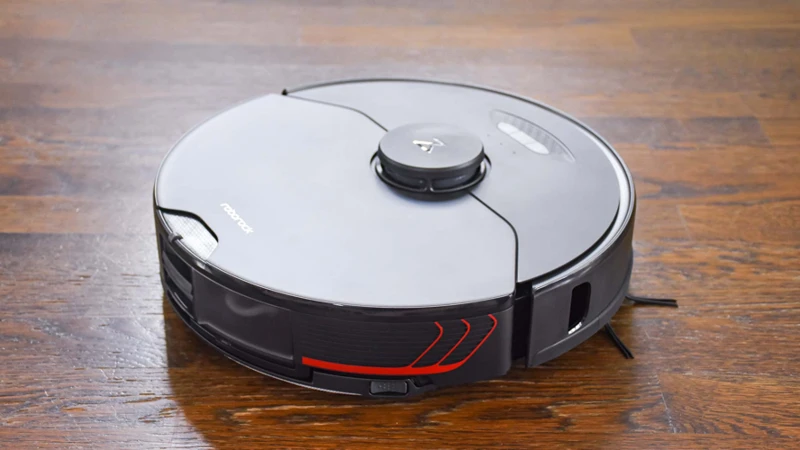
When considering buying a smart vacuum cleaner, there are several important factors to take into account. Here are some key points to keep in mind:
Battery Type and Capacity: The type and capacity of battery used in your smart vacuum cleaner can greatly impact its performance. Lithium-ion batteries offer longer runtime and faster charging times compared to other battery types. A higher capacity battery will also provide longer runtime and more powerful suction.
Charging Time: The charging time of a smart vacuum cleaner is an important consideration, especially if you have a large home or if you plan on using the vacuum cleaner frequently. Look for a vacuum cleaner with a short charging time so that it can be ready for use when you need it.
Runtime and Suction Power: The runtime and suction power of a smart vacuum cleaner are also important factors to consider. A longer runtime is ideal for larger homes, while stronger suction power is needed for cleaning thicker carpets and rugs. Keep in mind that these two factors are often trade-offs, with more powerful suction resulting in a shorter runtime.
Price and Brand: Smart vacuum cleaners come in a range of price points, from affordable models to high-end, feature-rich options. Consider your budget and what features you need when making your purchase. Additionally, it’s important to choose a reputable brand that offers good customer support and warranties.
By taking these factors into account, you can find a smart vacuum cleaner that is well-suited for your needs and preferences. Don’t forget to read reviews from other users to get a better idea of the product’s performance and reliability.
Battery Type and Capacity
When it comes to buying a smart vacuum cleaner, there are several factors that are important to consider. One of the most important factors is the battery type and capacity. Not all batteries are created equal, and some offer more power and runtime than others. Additionally, the battery capacity can impact how long the vacuum can run before it needs to be charged again. It’s important to understand the differences between battery types and capacities so that you can choose a vacuum that meets your needs and fits your lifestyle. Let’s explore this topic further.
Charging Time
When considering purchasing a smart vacuum cleaner, it is important to take into account the charging time. Nobody wants to have to wait excessively long for their vacuum cleaner battery to charge, especially if you have a larger living space that takes longer to clean. Here are some points to keep in mind:
- Battery Capacity: A vacuum cleaner with a larger battery capacity will require more time to charge than one with a smaller capacity. However, a larger capacity battery will provide you with a longer cleaning time, which can be more convenient.
- Charging Speed: The charging speed of a smart vacuum cleaner varies based on the model and brand. Some can take as little as 2 hours to fully charge, while others may take upwards of 5 hours. It is important to keep in mind how long the vacuum will take to charge, especially if you plan on using it on a daily basis.
- Charging Station: Most smart vacuum cleaners come with a charging station, which is where the vacuum is parked to recharge when not in use. It is important to consider the location of the charging station as well, as having it in a convenient, accessible location can make charging the vacuum cleaner much easier.
- Battery Life: The battery life of a smart vacuum cleaner is also important to consider. A longer battery life means you will not need to charge it as frequently, which can be a huge time-saver. Be sure to pay attention to both the charging time and battery life when selecting a smart vacuum cleaner based on your needs and preferences.
Keeping these factors in mind can help you make a more informed decision when purchasing a smart vacuum cleaner based on charging time. Remember to look for a vacuum cleaner that strikes a balance between battery capacity, charging speed, and battery life, to ensure that your cleaning routine is as efficient and effective as possible.
Runtime and Suction Power
One of the most important factors to consider when buying a smart vacuum cleaner is runtime and suction power, as they have a direct impact on how well the device can clean your home. Here’s what you need to know about these two important features:
Suction Power
The suction power of a smart vacuum cleaner is measured in Pascal (Pa) units, which indicate the amount of air pressure the cleaner can create to suck up dirt and dust. The higher the Pascal rating, the more powerful the cleaner’s suction is, and the better it can pick up debris from carpets, hard floors, and other surfaces.
To help you choose the right suction power for your needs, here is a basic guideline:
| Surface Type | Recommended Suction Power |
|---|---|
| Hard Floors, Low-Pile Carpets | 600 – 800 Pa |
| Medium-Pile Carpets | 800 – 1200 Pa |
| High-Pile Carpets or Pets with Long Hair | 1200 – 2000 Pa |
Runtime
The runtime of a smart vacuum cleaner refers to how long it can operate on a single battery charge before it needs to be recharged. This is an essential consideration, as a short runtime can be frustrating if the vacuum cleaner constantly needs to be recharged or if it fails to complete a cleaning job.
Generally, a runtime of at least 60-90 minutes is recommended for most homes, as this is enough to clean a single room or a small apartment. If you have a larger home or if you prefer to clean multiple rooms at once, you will need a smart vacuum cleaner with a longer runtime.
When comparing runtime, also pay attention to the type of battery the cleaner uses. Lithium-ion batteries tend to offer longer runtimes and faster charging times, making them a popular choice in smart vacuum cleaners.
It’s important to pay attention to both suction power and runtime when choosing a smart vacuum cleaner, as they are key factors that can affect the cleaning performance and convenience of the device.
Price and Brand
Choosing the right smart vacuum cleaner for your home involves considering different factors, including price and brand. While there are numerous options available in the market, the price and brand can significantly affect your purchase decision. Here are some points to keep in mind:
- Price: Smart vacuum cleaners are available in different price ranges, and the cost usually depends on the features and technology used. High-end models with advanced features typically cost more than basic models. However, a high price does not always guarantee better performance. It is important to determine your budget and research the features of different models to find the best vacuum cleaner that offers value for your money. Keep in mind that some retailers offer discounts or promotions that can help you save money on your purchase.
- Brand: There are several brands of smart vacuum cleaners available in the market, and each brand offers different features, technology, and reliability. While some brands are well-known and have been in the market for a long time, others are relatively new but offer innovative features that can make your cleaning experience better. It is essential to research the brand’s reputation, read reviews from other customers, and check the manufacturer’s warranty and customer support to ensure that you get a vacuum cleaner that is reliable and offers good customer service.
When choosing a smart vacuum cleaner, consider the price and brand. Determine your budget and research the features of different models to find the best value for your money. Research the reputation of the brand, read reviews, and check the warranty and customer support to ensure that you get a reliable vacuum cleaner.
How to Extend Your Smart Vacuum Cleaner’s Battery Life
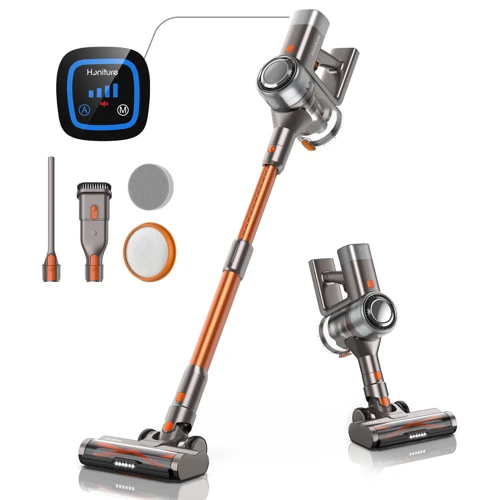
It’s important to make sure your smart vacuum cleaner’s battery life is optimized for maximum performance. Here are some tips to help you extend your smart vacuum cleaner’s battery life and get the most out of your cleaning sessions.
Use Eco or Low-Power Mode
Most smart vacuums have an Eco mode or low-power mode that consumes less energy than the normal mode. This mode reduces the suction power, but it can be useful if you are cleaning a relatively clean area or doing a light cleaning. Using the low-power mode can significantly extend your battery life.
Turn off Smart Features
Smart features like Wi-Fi connectivity and voice control are great, but they also drain your battery. So, when you don’t need to use these features, it’s best to turn them off. This can be done using the app that controls your smart vacuum.
Clean the Filter and Brush
If the filter and brush of your smart vacuum are dirty, it can clog the machine and cause it to consume more energy than usual. So, make sure you clean the filter and brush regularly to maintain optimal performance and extend your battery life.
Replace Batteries
Over time, your smart vacuum’s battery will start to degrade and will not hold a charge for as long as it used to. If this happens, it’s best to replace the battery rather than continue using a degraded battery that is not providing optimal performance.
Store in a Cool, Dry Place
Heat can damage the battery of your smart vacuum, so it’s best to store it in a cool, dry place when not in use. This will help to maintain the battery’s performance and extend its lifespan.
By following these tips, you’ll be able to extend your smart vacuum cleaner’s battery life and get the most out of your cleaning sessions.
Use Eco or Low-Power Mode
One of the ways to extend the battery life of your smart vacuum cleaner is by using a feature that reduces power consumption. By activating the eco or low-power mode, your device can run longer without draining the battery. But you might be wondering, how does this affect its cleaning performance? Don’t worry, we’ll explore the impact of using this feature and see if it’s worth sacrificing suction power for longer runtime. Let’s dive in!
Turn off Smart Features
When it comes to extending the battery life of your smart vacuum cleaner, turning off smart features is another simple yet effective solution. Smart features such as mapping, scheduling, and voice control are undoubtedly impressive, but they tend to consume a lot of battery power. If you don’t really need these features, turning them off can help your robot vacuum run for longer periods, especially if your battery is running low or you need to clean a large area.
To help you understand which smart features consume the most battery power, we’ve compiled a table below:
| Smart Feature | Impact on Battery Life |
|---|---|
| Mapping | High |
| Scheduling | Medium |
| Voice Control | Low |
As you can see, mapping has the highest impact on battery life. This is because mapping requires the robot vacuum cleaner to scan and keep track of the layout of your home, which can consume a lot of energy. If you don’t need your vacuum to map your home, consider turning off this feature. Scheduling is also relatively power-hungry, as it requires the robot to remember when it needs to clean and when it can rest. Voice control, on the other hand, has a minimal impact on battery life, as it only requires the robot to listen for your commands when you speak.
By turning off certain features that you don’t need, you can significantly extend your robot vacuum cleaner’s battery life, allowing it to run for longer periods and cover more ground. However, keep in mind that some features may be essential for you, so be sure to evaluate which features you can do without before turning them off.
Clean the Filter and Brush
Regular maintenance of the filter and brush is crucial for optimizing the battery life and performance of your smart vacuum cleaner. A clogged filter can obstruct air flow and reduce suction power, while tangled brushes can cause strain on the motor and reduce battery runtime. Follow these simple steps to keep your smart vacuum cleaner in top condition:
- Step 1: Turn off and unplug your smart vacuum cleaner before cleaning.
- Step 2: Remove the filter from the dustbin and tap it gently against a hard surface to remove any loose dirt or debris.
- Step 3: Rinse the filter under running water and allow it to air dry completely before reinserting it in the dustbin.
- Step 4: Remove the brush roll from underneath your smart vacuum cleaner and remove any tangled hair or debris with scissors or a cleaning tool.
- Step 5: Wipe the brush roll and its housing with a damp cloth and allow it to dry completely.
- Step 6: Reinsert the brush roll and turn on your smart vacuum cleaner to check for proper functionality.
By cleaning the filter and brush regularly, you can ensure that your smart vacuum cleaner maintains its optimal performance and prolong its battery life. It is recommended to perform this maintenance at least once a month or more frequently if you use your smart vacuum cleaner on a daily basis.
Replace Batteries
One way to extend the life of your smart vacuum cleaner’s battery is to make sure that the batteries themselves are in good condition. Over time, rechargeable batteries tend to lose their ability to hold a charge, which can significantly impact the performance of your vacuum cleaner. To address this issue, you may need to replace the batteries altogether. Here are some steps to help you replace the batteries in your smart vacuum cleaner:
- Identify the Battery Type: Before purchasing a new battery, make sure that you know the type of battery used in your smart vacuum cleaner. Some models use lithium-ion batteries, while others use nickel-metal hydride batteries. Knowing the type of battery you need ensures that you purchase the right one.
- Remove the Old Battery: Turn off your vacuum cleaner and unplug it from the charging dock. Carefully remove the screws or clips that hold the battery in place. Lift the battery out of its compartment and set it aside.
- Insert the New Battery: Take your new battery and insert it into the same compartment. Make sure that it is securely in place. Replace the screws or clips that you removed earlier to hold the battery in place.
- Charge the New Battery: Plug the vacuum cleaner into the charging dock and charge the new battery fully before using it. Make sure that the new battery is compatible with your vacuum cleaner’s charger to ensure a proper charge.
- Dispose of the Old Battery Properly: Rechargeable batteries are considered hazardous waste and should be disposed of properly. Check with your local recycling program for specific instruction on how to dispose of the old battery.
Replacing the batteries is an essential part of maintaining the performance of your smart vacuum cleaner. By following these steps, you can ensure that your vacuum cleaner’s battery is in excellent condition, providing you with the longest runtime possible.
Store in a Cool, Dry Place
Proper storage is crucial in extending the lifespan of your smart vacuum cleaner’s battery. Exposure to extreme temperatures and humidity can significantly affect battery performance and reduce its longevity. Storing your smart vacuum cleaner in a cool, dry place is highly recommended to ensure optimal battery performance and efficiency.
Here are some tips for storing your smart vacuum cleaner in a cool, dry place:
| Tip | Description |
|---|---|
| Avoid direct sunlight | Direct sunlight can produce heat and expose your vacuum cleaner’s battery to harmful UV rays. Store your vacuum cleaner in a shaded area to avoid direct sunlight. |
| Avoid humid areas | Humidity can cause damage to the battery and reduce its overall performance. Avoid storing your vacuum cleaner in areas with high humidity, such as the bathroom or the laundry room. |
| Use original packaging | If you still have the original packaging of your vacuum cleaner, use it to store the device. The packaging is designed to protect the vacuum from potential damage and provides a safe and dry place for storage. |
| Keep it away from liquid | Liquid can damage the battery and reduce its lifespan. Keep your vacuum cleaner away from any areas that might expose it to water, such as a sink or wet floor. |
| Disconnect the battery | If you plan to store your vacuum cleaner for an extended period, disconnect the battery from the device to prevent any unnecessary discharge. This can help prolong the lifespan of the battery and keep it in optimal condition. |
Following these simple tips can ensure that your smart vacuum cleaner’s battery is well-maintained and is always ready to use when you need it. Remember to always read the manufacturer’s instructions and guidelines for proper storage to avoid any potential damage or accidents.
What are the Best Smart Vacuum Cleaners with Long Battery Life?
When it comes to selecting the best smart vacuum cleaner with a long battery life, there are several options available in the market. However, only a handful of vacuum cleaners stand out in terms of delivering exceptional performance and battery power. Here are some top-notch smart vacuum cleaners with long battery life:
iRobot Roomba i7+
The iRobot Roomba i7+ is one of the top contenders due to its exceptional mapping technology, efficient performance, and long battery life. With a runtime of up to 75 minutes, this vacuum cleaner can clean your entire house effectively without having to pause for recharging. Additionally, it comes equipped with a self-emptying bin, smart mapping technology, and voice-activated controls for maximum convenience.
Eufy RoboVac 11S Max
If you’re looking for a budget-friendly option with an excellent battery life, the Eufy RoboVac 11S Max is your best bet. This vacuum cleaner is designed to clean your floors thoroughly without breaking the bank. With a runtime of up to 100 minutes, this vacuum cleaner can clean your entire home in a single charge. It has several useful features such as the BoostIQ Technology for extra suction power, anti-scratch tempered glass, and infrared-sensors for preventing collisions.
Shark IQ R101AE
The Shark IQ R101AE is known for its exceptional battery life and self-cleaning ability. With a battery runtime of up to 90 minutes, this vacuum cleaner can clean your house effectively without having to stop halfway for recharging. It also features a self-cleaning brush roll for tackling pet hair, dual-spinning side brushes for cleaning edges and corners, and a self-emptying dustbin for easy maintenance. Additionally, the Shark IQ R101AE comes with a mobile app that allows you to control and schedule the cleaning process with ease.
These are our top picks for smart vacuum cleaners with long battery life. They all offer exceptional performance, runtime, and come with useful features to make cleaning a breeze. However, before making a purchase, ensure you consider your unique cleaning needs and choose a vacuum cleaner that suits your lifestyle and budget.
iRobot Roomba i7+
As you search for the best smart vacuum cleaner with a long-lasting battery, the iRobot Roomba i7+ catches attention with its impressive features and capabilities. This advanced cleaning device boasts a powerful suction motor that can handle dirt, dust, and debris on any type of flooring. But what sets it apart is its innovative technology that enables it to map out your home and clean it systematically. Plus, with its long battery life, you can let it roam around your home without worrying about it running out of power. Let’s dive into the features and benefits of the iRobot Roomba i7+ that make it a top contender in the smart vacuum cleaner market.
Eufy RoboVac 11S Max
The Eufy RoboVac 11S Max is a great option for those in search of a reliable and powerful smart vacuum cleaner with a long battery life. Here are some key details that make this option stand out:
| Battery Type and Capacity | Lithium ion battery with a capacity of 2600mAh |
| Charging Time | Up to 5 hours |
| Runtime | Up to 100 minutes |
| Suction Power | 2000Pa |
| Smart Features | Comes with a remote control and can be synced with the Eufy Home app for easier control and scheduling. It also has anti-collision and drop-sensing technology, as well as the ability to return to its dock for recharging. |
| Price and Brand | Eufy is a relatively new brand in the smart vacuum cleaner market, but their products have gained popularity for their affordable price points and reliable performance. The RoboVac 11S Max is currently priced at around $250. |
With its impressive suction power and long battery life, the Eufy RoboVac 11S Max can handle a variety of messes, from pet hair to fine dust. Its smart features make it easy to use and control, making it a great investment for those looking to simplify their cleaning routine. Despite its budget-friendly price point, the Eufy brand has gained a reputation for durable and high-performing smart vacuum cleaners.
Shark IQ R101AE
The Shark IQ R101AE is a popular smart vacuum cleaner that has been recognized for its performance and efficiency. It offers numerous features that make it attractive to users looking for a reliable, high-quality cleaning solution. Here are some of the features that make the Shark IQ R101AE stand out:
- The Shark IQ R101AE boasts powerful suction capabilities that make it capable of picking up dust, dirt, and debris with ease, thanks to its self-cleaning brushroll and multi-surface cleaning capabilities.
- With its advanced mapping technology and self-emptying dustbin, the Shark IQ R101AE can clean large areas without the need for manual intervention, which is ideal for busy households or those with multiple pets.
- For those concerned about battery life and performance, the Shark IQ R101AE offers a long runtime and self-charging capabilities, ensuring that the unit is always ready to tackle cleaning tasks as needed.
- When it comes to maintenance, the Shark IQ R101AE offers a HEPA filter that traps allergens and pollutants, making it a suitable option for those with allergies or respiratory issues.
The Shark IQ R101AE is also easy to use and operate, with a user-friendly app that allows users to control settings and schedules remotely. Additionally, this smart vacuum cleaner is compatible with home assistant devices, making it easy to integrate into existing smart home setups. The Shark IQ R101AE is a reliable, powerful, and efficient smart vacuum cleaner that offers excellent suction power and features to help users maintain clean floors and surfaces in their homes.
Conclusion
In conclusion, the impact of battery life on the performance of smart vacuum cleaners cannot be overstated. A longer battery life means your smart vacuum cleaner can maintain its suction power for a longer period, clean more efficiently and get more work done before requiring a recharge. This is particularly important for those with larger homes or pet owners who require more frequent cleaning.
If you’re in the market for a smart vacuum cleaner, it’s important to consider factors such as battery type and capacity, charging time, runtime, suction power, price, and brand. The right balance of features will depend on your personal needs and preferences.
To extend the battery life of your smart vacuum cleaner, it’s important to use eco or low-power mode, turn off non-essential features, keep the filter and brush clean, replace batteries when necessary, and store your smart vacuum cleaner in a cool, dry place.
There are several smart vacuum cleaner models on the market that offer impressive battery life and performance. The iRobot Roomba i7+, Eufy RoboVac 11S Max, and Shark IQ R101AE are just a few of the options available to consumers.
Overall, a smart vacuum cleaner with a longer battery life is a wise investment for anyone looking to simplify their cleaning routine and have a more efficient, stress-free home. By taking the time to research and consider your options, you’re sure to find the perfect smart vacuum cleaner for your needs.
Frequently Asked Questions
1. Can battery life really affect my smart vacuum cleaner’s performance?
Yes, battery life is crucial for the overall performance of your smart vacuum cleaner.
2. How does battery life affect suction power?
A lower battery life means that the suction power of the vacuum cleaner may decrease, especially towards the end of the battery’s runtime.
3. Can the battery runtime affect the cleaning capabilities of the smart vacuum cleaner?
Yes, a smart vacuum cleaner with shorter battery runtime may not be able to clean larger spaces effectively.
4. What are the benefits of using a smart vacuum cleaner with long battery life?
A smart vacuum cleaner with a long battery life can clean continuously for a longer time, increasing its overall efficiency and performance.
5. What is the ideal battery type for a smart vacuum cleaner?
The ideal battery type for a smart vacuum cleaner is Lithium-ion, which provides a long runtime and quick charging time with high capacity.
6. Is charging time important when considering a smart vacuum cleaner purchase?
Yes, charging time is an important consideration when purchasing a smart vacuum cleaner as it can affect the efficiency and convenience of using the device.
7. Can smart features affect battery life?
Yes, smart features such as scheduling and mapping may drain the battery faster and decrease the device’s overall runtime.
8. How can I extend the battery life of my smart vacuum cleaner?
You can extend your smart vacuum cleaner’s battery life by using eco or low-power mode, turning off smart features, cleaning the filter and brush, replacing batteries, and storing it in a cool, dry place.
9. What is the difference between a traditional and smart vacuum cleaner regarding battery life?
A traditional vacuum cleaner usually consumes more electricity, and the battery life does not play a crucial role as it needs to be plugged in. In contrast, a smart vacuum cleaner’s battery life is vital as it affects mobility and performance without a cord.
10. Can the higher price of a smart vacuum cleaner justify its features?
Yes, the higher price of a smart vacuum cleaner can be justified by its convenient smart features, long battery life, and overall efficient performance that a traditional vacuum cleaner cannot provide.

